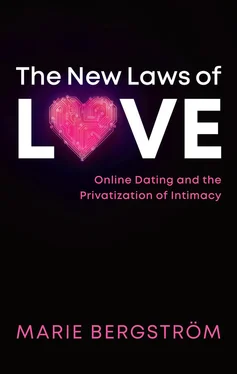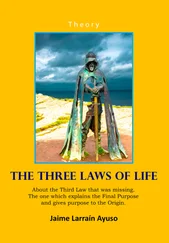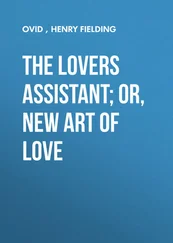Digital platforms have brought about a major shift. Dating sites and apps have become a common way of meeting partners, and this behavior has lost most of its former social stigma. Users come from all social milieus and background and, unlike older forms of matchmaking, these new ones appeal primarily to young people. The most recent survey carried out in the United States – the birthland of online dating – showed that 30% of American adults had already used a dating site or app in 2019. Among 18- to 29-year-olds, the percentage rose to 48% (Pew Research Center, 2020c). As online dating became commonplace, commercial matchmaking finally emerged from the shade, to reach a broad general public.
What made this change possible? How do we explain this unprecedented success of online dating, and what are the implications? To answer these questions is to draw a portrait of modern love and contemporary sexuality. This is the aim of the present book. By looking at dating and how it changes online, this book tells a new story of the transformation of intimacy, a story that differs considerably from what is currently said about this phenomenon.
Dominant discourses on online dating
The spread of online dating has not gone unnoticed. From the outset, the use of online platforms has commanded considerable attention from the media, essayists, and social scientists. One reason is interest in the phenomenon itself; but an even stronger reason is that online dating is considered to be a mirror of contemporary society. In it we tend to see reflected our hopes, and more often our fears, about the time we live in, about the new sexual norms and the future of social ties. The image that current writings on online dating projects is often an ugly one. It emerges from two main discourses that have largely come to frame popular understandings of online dating.
First, online dating is said to have profoundly changed sexuality by favoring short-term sexual connections at the expense of stable relationships. The term “hookup culture” is often used to describe the new paradigm (Wade, 2017). Although coined initially with reference to American campus culture, today it is used in a broader sense. The term has no exact translation in other languages, yet it resonates strongly with debates on online dating in many European countries. The core idea is that new sexual norms, together with the new technology, have made young people – sometimes referred to as the “Tinder generation” – unwilling to commit or incapable of commitment; they cast aside love and embrace casual sex instead. In particular, online dating would be responsible for the “banalization” of sex, its becoming as mundane as any leisure activity. According to French sociologist Jean-Claude Kaufmann, “a hook-up ( nuit chaude ) can now be scheduled as easily as going to the movies” (Kaufmann, 2010, p. 140). This familiar claim is based on the idea that sex is trivialized on the internet. Sometimes presented as sexual liberation, this development is more often depicted as the decay of love (Sessions Stepp, 2007; Freitas, 2013). Authors argue that romantic long-term relationships have been sapped by endless online opportunities of easy and uncommitted sex.
A second dominant discourse presents digital dating as a commodification of intimate relationships. Apps and sites are viewed as a Trojan horse that brings economic logic into the sphere of intimacy. Because dating platforms are supposedly structured as a market – governed by competition, self-marketing, and choice strategies – the outcome, it is argued, is an unprecedented rationalization of romantic and sexual behavior. This thesis is central to the work of Eva Illouz, whose incisive analysis has been highly influential. In her critical analysis of modernity, Illouz denounces the penetration of the “capitalist cultural grammar” into heterosexual romantic relationships (Illouz, 2012, p. 9). Dating websites, she argues, have played a key role in this historical movement: “Internet dating has introduced to the realm of romantic encounters the principles of mass consumption based on an economy of abundance, endless choice, efficiency, rationalization, selective targeting, and standardization” (Illouz, 2007, p. 90). Illouz also stresses the emergence of new sexual norms, to which she refers as a broader trend of “de-structuration of the romantic will” (p. 197). The internet, in combination with other cultural forces such as the rise of feminism and reliance on psychology, causes a loss of belief in love and a fear of commitment. If online dating indeed operates as a marketplace, then it is a “free market of sexual encounters” (p. 10).
These powerful arguments have commanded a vast audience. The idea that online dating revolves around commodification and intense sexualization is widespread, especially in Europe, and has largely dominated the debate in the social sciences (Salecl, 2010; Dröge and Voirol, 2011; Bauman, 2013; Lardellier, 2015). But, while identifying salient features of online dating – such as the standardized platforms, the often transient nature of online relationships, and the selection mechanisms that work in partner choice – these theses fail to tell the entire story. They pave the way for a harsh criticism of online dating, but fall short of capturing its specificity and explaining its success – explaining how and why people use these platforms. Besides, many empirical elements do not support these arguments.
The first such element is the fact that contemporary societies are still structured by a strong couple norm. Although young people have delayed their first union in a couple, a vast majority of them end up forming romantic relationships (Manning et al., 2014; Bellani et al., 2017; Roseneil et al., 2020). A significant proportion of today’s couples meet through online dating (Cacioppo et al., 2013; Rosenfeld et al., 2019; Potârcă, 2020) and, while these platforms stand accused of turning users into consumers incapable of committing to one person and settling down, surveys tend to show that partners who meet online actually commit more quickly than those whose encounter stems from other settings (Rosenfeld et al., 2019). The risk of breakup is not necessarily higher for these relationships; in the United States, for online couples, the risk of separation is the same as, or even lower than, for couples who meet in physical settings (Cacioppo et al., 2013; Rosenfeld, 2017). Moreover, the transformations of sexuality cannot easily be reduced to, or explained by, a theory of free markets. Online dating may indeed favor casual relationships, but that’s a far cry from being a trivialization and deregulation of sex. These platforms are permeated by powerful social norms, and notably by a gendered double standard that pervades the online world and leads men and women to engage in intimate relationships on very different terms (Bergström, 2012; Pinsky, 2019; Lamont, 2020).
The commodification thesis also poses problems theoretically, as it is either too vague or too extreme. If the argument assumes or implies that our behaviours, attitudes, and beliefs are affected by market economy and by our capitalist society, that is of course true. As social agents, we are inherently formed by the institutions and the means of production of our time. Having said that, we haven’t said much. But if commodification means that, with online dating, choosing a partner is essentially the same thing as choosing a yogurt in a supermarket or ordering a sweater from an online catalogue, the assertion is a pleasant trope, but it is wrong, too. The social process of couple formation, or casual dating, is significantly different from consumer behavior; it obeys specific norms and follows patterns of its own. As Viviana Zelizer (2005, p. 29) points out, the true relationship between intimacy and economy cannot be accounted for by theories that reason in terms of “nothing but” – as in partner choice is nothing but a market, or online dating is nothing but consumption. The way intimacy is influenced by the economy, as well as by other social forces, is a more complex process. It is a fine-grained investigation of this process that the present book sets out to write.
Читать дальше












